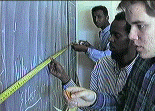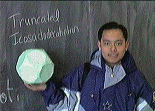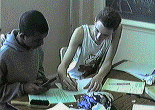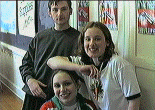
High School Geometry III
Roosevelt HS - Spring Trimester
Mr. David Wiggins


Geometry -- Table of Contents
This site includes

Course Information: High School Geometry III is the third course in a three trimester sequence. It continues with an inductive approach to understanding the concepts and terminology of elementary geometry. Geometric discoveries will be made through individual and group investigations. Important geometric formulas will be derived and applied to solve "real world" problems.
Geometry is everywhere. Knowing how and when to use the basic skills from this course can lead to enriching life experiences, as well as a successful academic career!



Prerequisites: It is assumed students entering this course have received a passing grade for High School Geometry I and II. Please consider long and hard how you plan to survive this course if you have not met these prerequisites. I am a fine teacher who will bend over backwards to help a student in need. I am not in the miracle business. If you are in this situation, please make the decision to work extra hard NOW!
Text: Discovering Geometry: An Inductive Approach, by Michael Serra
Grading: You will earn points for the following types of work:
- 700 pts -- Homework/Quizzes
- 300 pts -- Best Three of Four Chapter Tests
- 100 pts -- Extra Credit -- To boost your grade.
- 1000 pts-- Total points possible, not including extra credit
Grades are based on your total point accumulation for the trimester and will be given according to the following curve. To pass this course, you must earn at least 500 points.
97-100% -- A+
93-97% -- A
90-93% -- A-
87-90% -- B+
83-87% -- B
80-83% -- B-
77-80% -- C+
73-77% -- C
70-73% -- C-
63-70% -- D+
57-63% -- D
50-57% -- D-
Back to: Table of Contents

Expectations:
YOU are expected to:
- come prepared for class every day
- participate in class every day
- do the daily homework which is assigned
- work together cooperatively in your groups
- formulate and ask questions
- have some fun
- expect some difficulty
Mr. WIGGINS is expected to:
- come prepared to teach every day
- help students learn the concepts of geometry
- be available outside of class for questions
- give advice when asked
- give students timely feedback
- have some fun
- be stumped by a few questions
Rights:
YOU have the right to:
- be treated with respect by everyone in class
- work in a learning environment
- professional instruction from Mr. Wiggins
Mr. WIGGINS has the right to:
- be treated with respect by all his students
- teach in a learning environment
- enforce all school and classroom rules
- expect the most from his students!
Back to: Table of Contents

List of Topics to be Learned (* = as time permits):
Chapter 8 -- Areas: Rectangles, Triangles, Polygons, Circles
Chapter 9 -- Pythagorean Theorem: a2 + b2 = c2, Square roots, Right Triangles, Distances
Chapter 10 -- Volumes: Cubes, Prisms, Pyramids, Cylinders, Cones, Spheres
Chapter 11* -- Similarity: Triangle relationships, proportions, word problem solving
Chapter 12* -- Trigonometry: More triangle relationships, "trig" ratios, "trig" with calculators
Back to: Table of Contents

Basic Classroom Rules - Making STARS out of all of us!
- School Policy: Roosevelt school policies will be followed closely
- Talking: Students speak "one-at-a-time", and never while another has "the floor"
- Attendance: both physical and mental
- Respect: for yourself, others (especially Mr. Wiggins), and the learning materials
- Stay Seated: Students will remain seated unless given permission to do otherwise
If everyone works together, education can be enjoyable!!


Daily Routine:
- Class begins: the minute the bell rings.
- Daily problem: for everyone to work on when class begins.
- Solution to daily problem: the daily problem will be discussed and turned in
- Daily Lesson: investigations, discussions, and formula derivations
- Homework Assignment: each day you will be given problems to work on
- Time to work: you will be given time to work on the homework assignment
- Class Ends: when the bell rings....no sooner, and certainly, no later!!
- After school (except Tuesdays): Study sessions for students who:
- want some extra help
- are behind in their homework assignments
- would like to work on extra credit projects
- would like to just hang out and help others
Note these special items:
- Homework will be carefully graded: Presentation will count towards your score.
- You must show your work for full credit.
- You must get correct answers for full credit.
- Your completed work will remain in a file folder, that I will keep.
- You can use this folder when taking tests
- You can take the folder home to study for test
- You can always look in the folder to see your work
- Hall passes can only be given out when the daily lesson has been completed
- Please come to class prepared to concentrate on geometry!
- Take care of "business" during passing time (no pun intended?)
- If you have an emergency, then take care of it. Leave, and plead your case to the hall monitor, not me, during class learning activities.
- The door closes when the bell rings. No pass, no entrance. PERIOD.
- I start class when the bell rings. No exceptions. Please arrive early and get ready to work.
- If you happen to arrive late, you have two options:
- Head to room 111
- Go get a pass from whomever delayed you from making it to class on time.
Back to: Table of Contents

When you have read this, please bring it home and review it with a parent or guardian. After he/she has carefully reviewed this document, have it signed and return it by Friday March 15, 1996.

To the parent/guardian:
I am truly interested in enlisting you as an educational resource for your child. I would like you to take this opportunity to review the materials I have sent home with your child. Please familiarize yourself with the rules, procedures, and expectations that I have included, and encourage your child to understand their importance in creating an appropriate, healthy learning atmosphere both at home and at school.
It is my intention to open the lines of communication between parent, student, and teacher. If you are interested in helping me teach your child, I would encourage you to take time to fill out the information below. Please have your child return this by Friday, March 15. It counts as an assignment. I will do my best to honor your wishes in becoming an involved participant a child's education.
- Parent's Name(s)
- Home Phone
- Work Phone(s)
- Fax Number(s)
Check the boxes which apply to you:
- Call or fax me if my child starts to get behind
- Call or fax me if my child is not showing up for class regularly
- I would like regular updates on my child's progress
- I would like to visit with you sometime after school to discuss my child's progress
Dave Wiggins Information
Phone Number: Roosevelt High School -- 627-2658
E-mail: dwiggins@math.umn.edu
Web Page: http://www.geom.umn.edu/~dwiggins
Note to parents:
I am committed to providing my students quality mathematics instruction and also expect that they are committed to making the most of their educational opportunities at Roosevelt. Being a high school student is a full-time job which has very demanding requirements. With this in mind I offer the following:
Suggestions: How you can help in your child's education
- Attend class regularly: Please try to avoid planning family trips and non-emergency appointments which conflict with school attendance.
- Be at school on time: Your child should eat breakfast and start the day with a positive attitude.
- Complete daily assignments on time: A classroom lesson is most effective when students work on homework problems as soon after the class as possible. Coming to class without completing the assignment will handicap your child. Lack of skill development and insufficient practice make new lessons and assignments more difficult.
- Use free time wisely: A student who has free time should put it to good advantage by reviewing schoolwork, watching thought provoking television, or by reading independently for fun.
- Keep an organized notebook for each class: Organized notes lead to organized minds. Notes should include a list of the major daily objectives, definitions, main ideas and formulas presented in class.
- Practice good study habits at home: Possibilities include:
Your child can:
- establish a set time to study each night
- spend time reviewing previous work before beginning a new assignment
- spend time reviewing and reflecting when working on longer assignments
- collect study materials in one place
- keep up with daily assignments
You can:
- provide an environment free from distractions (TV, siblings, etc.)
- monitor your child's progress and lend support (if possible) when things get tough
- provide assistance if possible
- Prepare systematically for tests: Keeping a list of the important objectives in an organized notebook is an excellent first step (see #5). Begin a review of the objectives and previous assignments a few days before the test. Focus on the objectives which seemed to cause the most difficulty.
- Be psychologically ready for tests: One of the best ways to become emotionally prepared to take a test is to be academically prepared. The majority of test anxiety is caused by inadequate study preparation.
- Take advantage of special opportunities at school: Your child should make use of the school library resources and the individual help offered by staff members before and/or after school.
- Choose a part-time job wisely: Although it is important for students to have some work experience prior to leaving high school, holding jobs can have detrimental effects on student performance. If possible, a students job should take place primarily in the summer, on weekends, or in the afternoon. Tired students cannot concentrate on his/her schoolwork.

Your comments and suggestions are welcome!
Send your comments by e-mail to dwiggins@math.umn.edu
Back to: Dave Wiggins' Resume
Back to: Dave Wiggins' Homepage
Back to: Table of Contents
Thanks for visiting!


